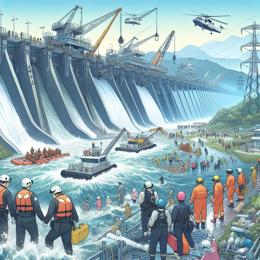Image created by AI
Butterworth's Environmental Crisis: Untreated Sewage Spill Runs Unabated for Eight Years
A longstanding environmental hazard has been plaguing the town of Butterworth, in the Eastern Cape of South Africa. The Gcuwa River, a water source that eventually merges with the Great Kei River, has been subjected to a continuous flow of raw sewage for the past eight years. This dire situation is due to malfunctioning sewage pump stations adjacent to the Sikiti and Eugene informal settlements, which have yet to be repaired.
Discovered by investigative journalism platform GroundUp in 2017 following reports by concerned residents, the sewage issue highlights a significant health risk for those living in the adjacent communities. Initially, Amathole District Municipality acknowledged the ongoing spills from two pump stations. Fast forward to the present day, and the same issues persist—a testimony to a systemic failure in addressing critical infrastructure malfunctions.
Local resident Zimvo Tom articulates that the situation is at its worst during the mornings and despite previous attempts by community leaders and ward councillors to get the issue resolved, there has been no remedy. He, like many others who rely on the contaminated river for daily activities, feels defeated after years of inaction.
Beyond just the stench and the sight of the spills, this environmental crisis spells more profound concerns. The poisoned waters rise and flood dwellings during heavy rains, compounding the existing pollution with waste from nearby illegal dumpsites that the municipality doesn't clear. Such conditions pose severe health risks and further disenfranchise the affected informal settlement residents.
Ntombokhanyo Maqanqa, a resident of Sikiti, has raised concerns about the potential health impacts and mentioned how the local economy has also suffered. Farmers and dairy vendors reliant on the river for their livestock and production can no longer carry on with their trades, thereby disrupting livelihoods and nutrition sources for the community.
The situation appears trapped in a cycle of neglect and finger-pointing. Amathole District Municipality's spokesperson, Sisa Mwisa, stated that illegal electrical connections to the pump station power supply have caused phase imbalances, preventing repairs to the pump stations. They have reached out to Mnquma Local Municipality and Eskom but to no avail. Eskom, on its part, points to rampant vandalism and the pressure of illegal connections resulting in network overloads as underlying issues contributing to the environmental crisis.
It is clear that a multifaceted approach is required to address this complex issue—one that involves securing the infrastructure against illegal activity, completing the electrical project to remove the need for such connections, and, importantly, repairing the failing pump stations. Without substantial intervention, residents in Butterworth and the broader environmental ecosystem connected to the Gcuwa River will continue to suffer.
The urgency for environmental and human welfare at stake in Butterworth must not remain on the back burner. This incident spotlights the need for efficient governance and maintenance of critical infrastructure to prevent such protracted ecological disasters. The local and district municipalities, in collaboration with Eskom and community leaders, need to rapidly devise a plan that resolves the current plight and reinstates the ecological balance and health of the communities by the Gcuwa River.










